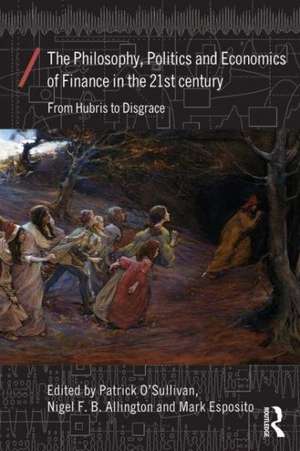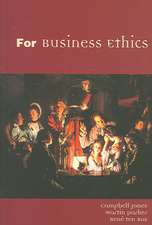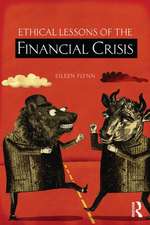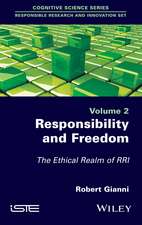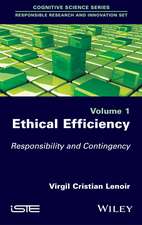The Philosophy, Politics and Economics of Finance in the 21st Century: From Hubris to Disgrace: Economics as Social Theory
Editat de Patrick O'Sullivan, Nigel Allington, Mark Espositoen Limba Engleză Paperback – 20 apr 2015
This book is unified by the view that the financial sector had been a self-serving and self-regulating elite consumed by greed, speculation and even lawlessness, with little sense of responsibility to the wider society or common good. In light of critical analysis by authors from a variety of backgrounds and persuasions, suggestions for reform and improvement are proposed, in some cases radical reform. By placing the world of finance under a microscope, this book analyses the assumptions that have led from hubris to disgrace as it provides suggestions for an improved society.
Rooted in philosophical reflection, this book invites a critical reassessment of finance and its societal role in the 21st century. This book will be of interest to academics, politicians, central bankers and financial regulators who wish to improve the morality of finance.
| Toate formatele și edițiile | Preț | Express |
|---|---|---|
| Paperback (1) | 470.85 lei 6-8 săpt. | |
| Taylor & Francis – 20 apr 2015 | 470.85 lei 6-8 săpt. | |
| Hardback (1) | 1343.11 lei 6-8 săpt. | |
| Taylor & Francis – 20 apr 2015 | 1343.11 lei 6-8 săpt. |
Din seria Economics as Social Theory
-
 Preț: 310.53 lei
Preț: 310.53 lei -
 Preț: 279.86 lei
Preț: 279.86 lei -
 Preț: 356.10 lei
Preț: 356.10 lei - 8%
 Preț: 441.24 lei
Preț: 441.24 lei - 15%
 Preț: 543.23 lei
Preț: 543.23 lei -
 Preț: 295.82 lei
Preț: 295.82 lei -
 Preț: 428.09 lei
Preț: 428.09 lei - 18%
 Preț: 1436.89 lei
Preț: 1436.89 lei - 15%
 Preț: 419.81 lei
Preț: 419.81 lei - 26%
 Preț: 354.65 lei
Preț: 354.65 lei - 15%
 Preț: 426.70 lei
Preț: 426.70 lei - 15%
 Preț: 470.87 lei
Preț: 470.87 lei -
 Preț: 377.66 lei
Preț: 377.66 lei -
 Preț: 478.03 lei
Preț: 478.03 lei -
 Preț: 417.20 lei
Preț: 417.20 lei - 15%
 Preț: 576.47 lei
Preț: 576.47 lei - 43%
 Preț: 207.05 lei
Preț: 207.05 lei - 26%
 Preț: 766.31 lei
Preț: 766.31 lei -
 Preț: 532.58 lei
Preț: 532.58 lei - 15%
 Preț: 430.45 lei
Preț: 430.45 lei - 30%
 Preț: 850.99 lei
Preț: 850.99 lei - 15%
 Preț: 456.21 lei
Preț: 456.21 lei - 15%
 Preț: 422.26 lei
Preț: 422.26 lei - 15%
 Preț: 458.59 lei
Preț: 458.59 lei - 26%
 Preț: 1217.42 lei
Preț: 1217.42 lei - 18%
 Preț: 1672.42 lei
Preț: 1672.42 lei - 30%
 Preț: 1017.37 lei
Preț: 1017.37 lei - 15%
 Preț: 515.60 lei
Preț: 515.60 lei - 27%
 Preț: 251.80 lei
Preț: 251.80 lei - 18%
 Preț: 1000.27 lei
Preț: 1000.27 lei - 18%
 Preț: 1282.67 lei
Preț: 1282.67 lei - 15%
 Preț: 463.49 lei
Preț: 463.49 lei - 15%
 Preț: 478.96 lei
Preț: 478.96 lei
Preț: 470.85 lei
Preț vechi: 553.95 lei
-15% Nou
Puncte Express: 706
Preț estimativ în valută:
90.11€ • 97.84$ • 75.69£
90.11€ • 97.84$ • 75.69£
Carte tipărită la comandă
Livrare economică 23 aprilie-07 mai
Preluare comenzi: 021 569.72.76
Specificații
ISBN-13: 9780415859011
ISBN-10: 0415859018
Pagini: 532
Ilustrații: 45 black & white illustrations, 9 black & white tables, 45 black & white line drawings
Dimensiuni: 156 x 234 x 30 mm
Greutate: 0.73 kg
Ediția:1
Editura: Taylor & Francis
Colecția Routledge
Seria Economics as Social Theory
Locul publicării:Oxford, United Kingdom
ISBN-10: 0415859018
Pagini: 532
Ilustrații: 45 black & white illustrations, 9 black & white tables, 45 black & white line drawings
Dimensiuni: 156 x 234 x 30 mm
Greutate: 0.73 kg
Ediția:1
Editura: Taylor & Francis
Colecția Routledge
Seria Economics as Social Theory
Locul publicării:Oxford, United Kingdom
Public țintă
Postgraduate and UndergraduateCuprins
- Introduction: The Nadir of 2008 and its Aftermath 2. Asset Management: Some Considerations on Performance 3. Risk in the Age of Crises 4. Financialisation 5. Is Islamic Finance a Complement to Conventional Western Finance? Underlying Principles and Viability 6. We’re Still Dancing: Stakeholder Expectation and its role in Decision Making in the Financial Sector 7. The Impact of the Subprime Financial Crisis on the Eastern European Transition Economies and Why Poland is an Outlier? 8. China as cause and victim of the US subprime financial crisis 9. Default Invariance: A Naïve Category Theory of Law and Finance 10. Europe Needs the Liberal Keynes 11. Neologism as Theoretical, Innovation in Economics: The case of ‘Financialisation’ 12. Ethics: From Negative Regulations to Fidelity to the Event 13. The Bank, its Societal Functions and its Practices: Conflictual Relationships between an Economic Agent and Democracy 14. The Sufficiency Economy: a Thai Response to the Asian Financial Crisis 15. Ethics should not Cloud Business or Financial Decisions: or the enduring power of the Neo-classical Paradigm 16. The state as a potentially immoral catalyst in financial crises 17. The Psychology of Unethical Behavior in the Finance Industry 18. Financial Liberalism and New Institutional Environment: The 2007-08 Financial Crisis as a (de)Regulatory Deadlock 19. Naturalising Techniques and Naturalised Discourses: Thoughts on the Media’s Role in the Great Recession 20. The All-encompassing Hijack 21. Heated Debates and Cool Analysis: Thinking well about Financial Ethics 22. Developing Country Perspectives: A look at the Nigerian Banking Sector Crisis 23. Theological and Historical Perspectives on Contemporary Accounting 24. Whither Finance now?
Notă biografică
Patrick O’Sullivan is Professor of Business Ethics and Corporate Social Responsibility at Grenoble École de Management, France, and University of Warsaw, Poland.
Nigel F.B. Allington is Professor of Applied Macroeconomics at the Grenoble École de Management, France, and Fellow and Director of Studies in Economics at Downing College, University of Cambridge, UK.
Mark Esposito is Associate Professor of Business and Economics at Grenoble École de Management, France, a member of the teaching faculty at the Harvard University Extension School, and Senior Associate at the University of Cambridge-CISL, UK.
Nigel F.B. Allington is Professor of Applied Macroeconomics at the Grenoble École de Management, France, and Fellow and Director of Studies in Economics at Downing College, University of Cambridge, UK.
Mark Esposito is Associate Professor of Business and Economics at Grenoble École de Management, France, a member of the teaching faculty at the Harvard University Extension School, and Senior Associate at the University of Cambridge-CISL, UK.
Recenzii
This is a timely set of essays that raise issues that are essential for understanding how finance ought to work in the 21st Century. The authors set finance squarely in the middle of society and its institutions. The analysis is superb.
R. Edward Freeman is University Professor and Olsson Professor, The Darden School University of Virginia, USA.
This book is an important contribution to the critique of social theory.... Perched on a fundamental question of legitimacy, this impressive new volume clarifies why the financial paradigm is flawed and how it is based on a profound intellectual fallacy that has caused so much instability in modern societies. Well balanced between inquiry and advocacy, this book is a modern must read for a wide range of readers.
Bruno S. Sergi, University of Messina and Harvard University, USA.
A thought-provoking collection of essays that ask many intriguing questions about how we got to where we are and how we can move to a better place. An essential read for those who are not satisfied by orthodox thinking about the current financial recession, and how we best respond to it.
Professor Keith Whitfield, Professor of Human Resource Management and Economics, Cardiff University, Wales.
R. Edward Freeman is University Professor and Olsson Professor, The Darden School University of Virginia, USA.
This book is an important contribution to the critique of social theory.... Perched on a fundamental question of legitimacy, this impressive new volume clarifies why the financial paradigm is flawed and how it is based on a profound intellectual fallacy that has caused so much instability in modern societies. Well balanced between inquiry and advocacy, this book is a modern must read for a wide range of readers.
Bruno S. Sergi, University of Messina and Harvard University, USA.
A thought-provoking collection of essays that ask many intriguing questions about how we got to where we are and how we can move to a better place. An essential read for those who are not satisfied by orthodox thinking about the current financial recession, and how we best respond to it.
Professor Keith Whitfield, Professor of Human Resource Management and Economics, Cardiff University, Wales.
Descriere
Since 2008 the financial sector has been the subject of extensive criticism. Much of this criticism has focussed on the morality the actors involved in the crisis and its extended aftermath. This book analyses the key moral and political philosophical issues of the crisis and relates them to the political economy of finance. It also examines to what extent the financial sector can or should be reformed.
